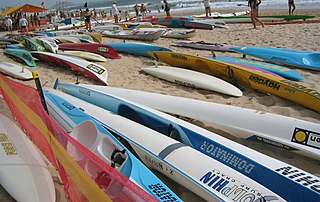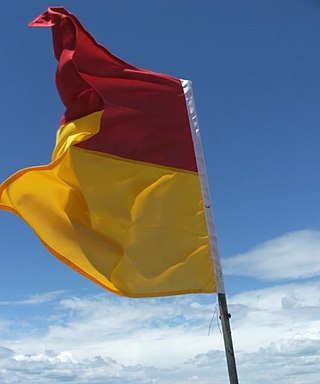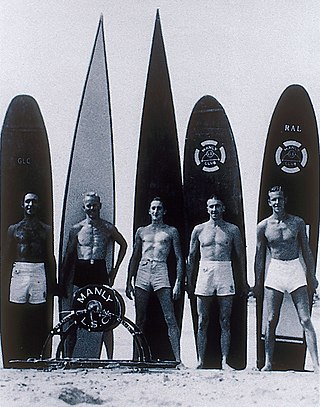
Surf lifesaving is a multifaceted social movement that comprises key aspects of voluntary lifeguard services and competitive surf sport. Originating in early 20th century Australia, the movement has expanded globally to other countries, including New Zealand, Ireland, South Africa, and the United Kingdom. Surf lifesavers in Australia are colloquially known as "Clubbies".

A lifeguard is a rescuer who supervises the safety and rescue of swimmers, surfers, and other water sports participants such as in a swimming pool, water park, beach, spa, river and lake. Lifeguards are trained in swimming and CPR/AED first aid, certified in water rescue using a variety of aids and equipment depending on requirements of their particular venue. In some areas, lifeguards are part of the emergency services system to incidents and in some communities, lifeguards may function as the primary EMS provider.

A surf ski is a type of kayak in the kayaking family of paddling craft. It is generally the longest of all kayaks and is a performance oriented kayak designed for speed on open water, most commonly the ocean, although it is well suited to all bodies of water and recreational paddling.
The Royal Life Saving Society UK is a drowning prevention charity founded in 1891 in the UK. It has had Royal Patronage since 1904.
Surf Life Saving Northern Region is the largest of four regions that make up Surf Life Saving New Zealand. As of the 2021/2022 season, it is made up of 18 clubs that look after 22 patrol locations from Ahipara to Raglan on the West Coast and from Whangārei Heads to Takapuna on the East Coast.

Surf Life Saving New Zealand (SLSNZ) is the national association representing 74 Surf Life Saving Clubs in New Zealand. The organisation's motto is 'In it for Life'. This refers to both the long relationship many members have with the organisation, as well as to the organisation's purpose of preventing drowning and injury, thereby saving lives.

Surf life saving clubs are volunteer institutions at Australia's beaches. The clubs conduct surf lifesaving services on weekends and public holidays, and in the 2014-2015 season they saved 12,690 people. They also host many beach sport activities, such as Nippers, surf carnivals and other competitions. The SLSCs are responsible for the education of lifesavers including operation of inflatable rescue boats (IRBs) and maintaining radio communication with other beaches and air rescue resources.

The Manly Life Saving Club is one of Australia's oldest Surf Life Saving Clubs, founded in 1911; located in the Sydney suburb of Manly, in the Northern Beaches Council in New South Wales.

Cronulla Beach, is a patrolled beach on Bate Bay in the Sydney suburb of Cronulla, New South Wales, Australia. The Cronulla Pavilion and the Cronulla Lifesaving Club are two prominent buildings located close to the sand. Cronulla Park sits behind the beach. The Cronulla Rock Pools are between Cronulla Beach and North Cronulla beach. The Alley is the local name given to the area between Cronulla Beach and North Cronulla Beach. Shark Island is a dangerous reef break, located off Cronulla Beach.

Surf Life Saving Australia (SLSA) is an Australian not-for-profit community organisation that promotes water safety and provides surf rescue services.

Lifesaving is the act involving rescue, resuscitation and first aid. It often refers to water safety and aquatic rescue; however, it could include ice rescue, flood and river rescue, swimming pool rescue and other emergency medical services. Lifesaving also refers to sport where lifesavers compete based on skills, technique, speed and teamwork. Lifesaving activities specialized in oceanic environment is called surf lifesaving or coastal lifesaving.

In Australian culture sports carnivals are held to perform competitions in the individual or team disciplines like athletics, swimming or surf lifesaving. Teams from different clubs or schools gather together for both individual point-score and team score. Often, the carnival is opened by a parade with the teams marching in uniforms and flags over the field of competition.
The Bronte Surf Lifesaving Club (BSLSC) is a surf lifesaving club in Bronte, New South Wales, Australia. It was founded in 1903 and the movement has since spread to other parts of New South Wales and the rest of the country.
The South Port Surf Lifesaving Club (SLSC) was established in 1959 in the coastal Adelaide suburb of Port Noarlunga, South Australia, and it is currently situated in the sand dunes at the mouth of the Onkaparinga River Estuary. Due to its location at the mouth of a major South Australian river and its position in Gulf St Vincent, South Port is a renowned surfing beach for both board riders and body surfers.
The Bondi Surf Bathers' Life Saving Club is Australia's oldest Surf Life Saving Club, founded in 1907. The club was officially established on 21 February 1907 at the Royal Hotel in Bondi, New South Wales. The club's aim is to ensure "No Lives Lost" at Bondi Beach and is a volunteer organisation that patrols Bondi Beach from October to April every year.
The Palm Beach Surf Life Saving Club is an Australian Surf Life Saving Club. The Club offers a range of activities and encourages members to continually develop and update their lifesaving skills. It is located at the southern end of Palm Beach, New South Wales, and members provide voluntary patrols on weekends and public holidays. Its members participate in internal and external competitions. Palm Beach Surf Life Saving Club is a voluntary, non-for-profit organisation. It is considered that "if you have on your resume that you're a member of Palm Beach Surf Club, you've really made Sydney's social set."

The Cronulla Surf Life Saving Club, was one of the first surf clubs established in Australia in 1907. The club is located in the southern Sydney suburb of Cronulla, which had very humble beginnings in a tram carriage and today the clubhouse is housed in a magnificent art deco building on the beachfront, that was built in 1940.
The Wanda Surf Lifesaving Club was established in 1946 after World War II by a group of men who banded together, from the North Cronulla Surf Life Saving Club who were being asked to patrol this stretch of beach, being a considerable distance from the Cronulla area. The colours of Army red, Air Force blue, and Navy blue were adopted as the club colours. The club, located on Marine Esplanade, has grown in size to its current membership of over 900 male and female members, ranging in age from five-year-old Nippers to the original Founding Members.
The Freshwater Surf Life Saving Club, established in 1908, is located at Freshwater Beach in Australia. It has become a large volunteer organization with strong community bonds. The club was founded by a push from government to foster safer beach practices. It is a part of Surf Life Saving Australia, a not-for-profit organization committed to keeping the beach safe for patrons and providing beach rescue services. A visit to the club from United States' surfer, Duke Kahanamoku, in 1914 helped initiate the sport of surfing in Australia.

Lifesaving, also known as lifesaving sport, is a group of sports disciplines based on the practices of lifesaving.













